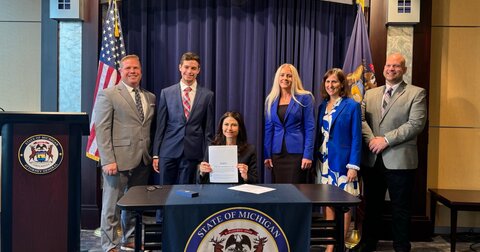Nessel backs California-style consumer enforcement in Michigan bill
Legislation would let attorney general wield consumer deception law in oil lawsuit
A bill approved by the Michigan Senate in June could end up supporting Attorney General Dana Nessel’s promised environmental lawsuits against oil companies. Senate Bill 134, which its sponsor praised as a consumer protection measure, would create a fund for the attorney general's office to fill with money extracted from private companies in the form of legal damages.
Sen. Sam Singh, D-East Lansing, said his bill would improve the state’s consumer protection laws, particularly the Michigan Consumer Protection Act. But an immediate beneficiary would be Nessel's office, which has retained a team of out-of-state trial lawyers to find grounds to sue energy firms over alleged harm stemming from global warming.
“Whether they’re at the grocery store or paying to get their AC fixed — no matter the good or service — Michiganders deserve honesty and transparency in their day-to-day activities and purchases,” Singh said in a press release. “Michigan’s weak consumer protection laws currently leave residents across the state vulnerable to exploitation.”
SB 134 would create the Consumer Protection and Antitrust Revolving Enforcement and Education Fund, a new account for the attorney general’s office that would be funded by damages the office obtains through class actions, whether actual damages or $250 per class member. The amount of revenue created for the new fund would depend on how effectively the attorney general enforced the proposed law, according to an analysis by the nonpartisan Senate Fiscal Agency.
The Michigan Chamber of Commerce opposes the bill, said Wendy Block, the organization’s senior vice president of business advocacy.
“This unfortunately partisan bill would expose all state-regulated businesses and professions — including doctors, lawyers, banks, auto dealers, casinos, insurers, utilities, and more — to frivolous and abusive litigation, class action lawsuits, treble damages, and inconsistent judgments from courts and regulators,” Block said in a press release. “While this bill may be good for plaintiff attorneys and their pocketbooks, it’s bad for small businesses and our state’s economic climate and competitiveness.”
In 2024, Nessel announced plans to sue oil companies for allegedly contributing to climate change. Her office has yet to file a suit, but reporting from Michigan Capitol Confidential prompted the U.S. Department of Justice to sue Nessel and Gov. Gretchen Whitmer in April. The attorney general has moved to dismiss the federal suit on the grounds that she has yet to take action against private energy companies.
While Michigan allows advisory opinions on the constitutionality of certain things, federal courts do not. If Nessel wins the motion to dismiss and then sues an energy provider, the federal government could refile the complaint. But if she wins and doesn’t file because of this suit, the DOJ would get what it wants anyway.
Nessel’s office supports the Senate bill, which would become law only if the House passes it and Whitmer gives her approval.
“While the Michigan Consumer Protection Act does still cover some unscrupulous practices, it leaves thousands of Michiganders unprotected from price gouging at grocery stores or deceptive sales contracts at used car dealerships – all because these acts are committed by licensed businesses,” Nessel said in a press release. “This legislation would restore the MCPA’s original purpose: protecting Michigan’s residents from deceptive and predatory conduct.”
The attorney general’s office received more than 10,000 written complaints and 20,000 complaints via phone call in 2024, it said in a March 2025 press release.
Nessel’s litigation campaign seems to be modeled on a tactic from California, the law firm Vinson and Elkins explains on its website.
In 2024, California Attorney General Rob Bonta sued five large oil companies: BP, Chevron Corp., Exxon Mobil Corp., Phillips 66 and Shell Plc. He also sued the American Petroleum Institute.
Bonta’s lawsuit claims that the companies deceived consumers and contributed to climate change. In filing the lawsuit, the California attorney general used a novel legal weapon granted to him by AB 1366, Vinson and Elkins wrote. This new law does not address environmental issues, but it lets the attorney general “seek disgorgement of profits from companies found to have committed violations of consumer protection laws” such as those governing false advertising.
Before California enacted AB 1366, victims of false advertising could receive no more than $2,500 per violation.
Michigan Capitol Confidential is the news source produced by the Mackinac Center for Public Policy. Michigan Capitol Confidential reports with a free-market news perspective.


 Judge freezes Michigan’s $645M in work projects
Judge freezes Michigan’s $645M in work projects
 Michigan lawmaker aims to ban the sale of lab-grown meats statewide
Michigan lawmaker aims to ban the sale of lab-grown meats statewide
 Michigan has referred 24 people for prosecution over wetland laws over 3 years
Michigan has referred 24 people for prosecution over wetland laws over 3 years